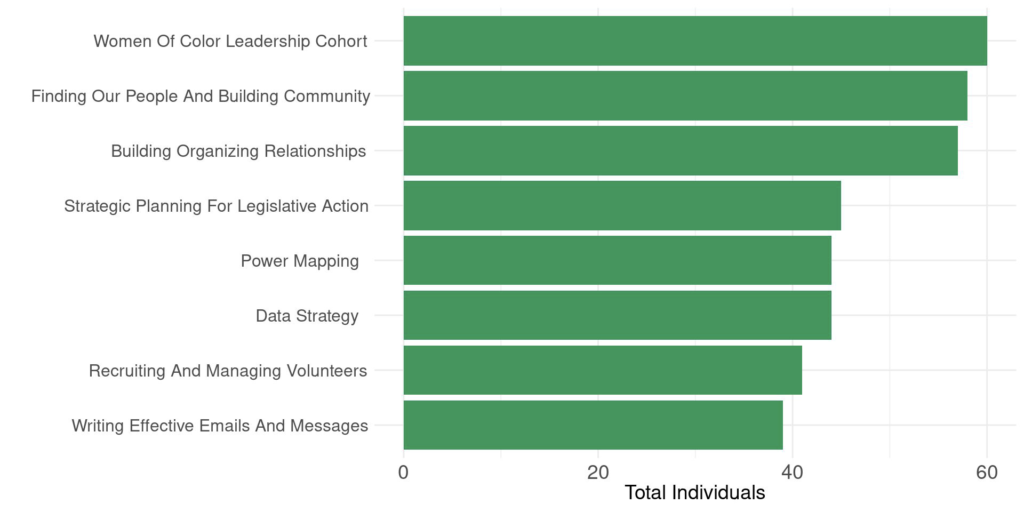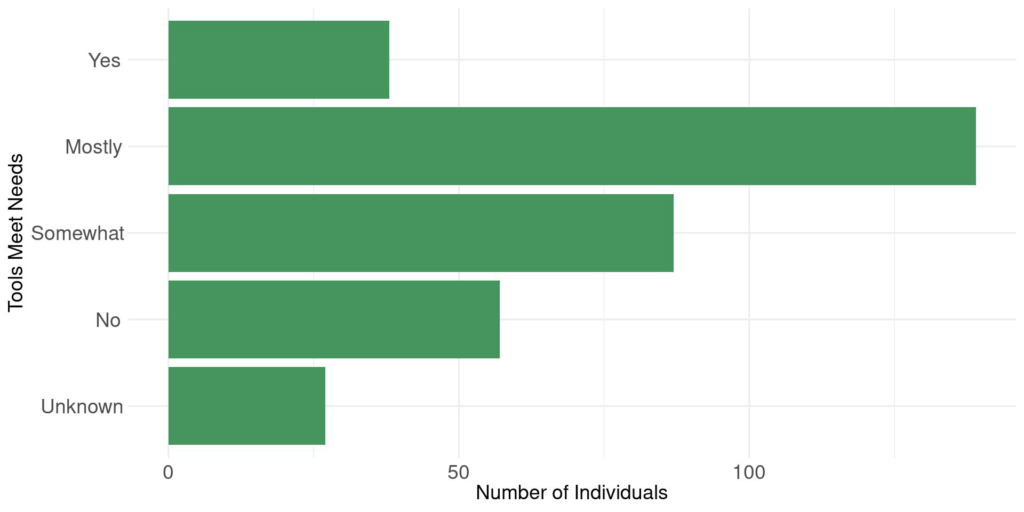On Monday August 22nd re:power is hosting a movement briefing to discuss these findings and most importantly to dig deeper into the solutions we’ve listed below. We hope to see you there!
In March 2022, re:power launched our 2022 Organizer Survey in partnership with Analyst Institute. Our goal was to survey organizers spanning the progressive sector to understand their short and long term challenges and needs. We were particularly interested in understanding the needs of BIPOC organizers.
re:power engaged organizers to participate in our survey through our partners. Partners were sent unique URLs to share with their staff, volunteers, and networks. In the end we had 349 completed surveys. Unfortunately, despite a concerted effort, we were unable to reach the majority BIPOC audience we were striving to reach*. Despite this limitation, we were still able to subset Black organizers and BIPOC women organizers for deeper analysis.
* Note: re:power is thinking deeply about how we might change future survey dissemination tactics to better reach the audience we hoped to reach. As a primarily BIPOC organization, we are also keenly aware of the ways in which information has often been extracted from Black, Indigenous and other communities of color in ways that did not serve that community.

Respondent Demographics
60% of respondents self-identify as White, 20% as Black or African American, 11% as Latinx or Hispanic and 10% as Asian or Asian American. 71% self-identify as women and 3% as transgender. 22% of respondents self-identify as having a disability. About 28% are first or second-generation immigrants and 34% are re:power alumni! Among the alumni, the training that was most commonly attended was Intro to Digital Organizing. The majority of respondents have at least 5 years of organizing experience and many have 10+. The majority of respondents work in community, electoral and/or legislative organizing and coalition building.
Key Findings
So what DID we learn from organizers? The short answer is that the number one threat to our movement is not external — it’s coming from within. Organizers on the whole are most concerned with organizer burnout in the short-term and long-term. This was consistent across all types of organizing.
BIPOC women and Black organizers also cited the disconnect between power-building and bettering people’s lived experiences as a top short-term (next 18 months) challenge in addition to organizer burnout. We can draw two conclusions from this finding: 1) Black and BIPOC women organizers themselves are struggling to see the impact of their work on bettering their lived experience and 2) these organizers are concerned that the lack of progress in improving their communities’ material conditions will erode the power-building work they are currently doing.
In the long-term (next 5 years), organizers cited as their top challenge entrenched powers external to organization preventing change, followed closely by organizer burnout. For Black organizers, lack of funding and organizational sustainability were the top two challenges. For BIPOC women organizers, entrenched powers external to organization preventing change and organizer burnout remained at the top followed closely by lack of funding and organizational sustainability.
While none of this is new information for our movement, we found it particularly affirming to see these challenges named so plainly and to see the clear differences in the challenges Black organizers are facing when compared to the movement as a whole. Our survey also asked organizers to think about what they need in order to address the challenges they are facing.
Short-term and long-term needs across organizers were consistent: more funding for their organizations’ work, more or better collaboration with other orgs, and more support to address or prevent burn-out. BIPOC women and Black organizers named training opportunities as an additional short-term need, superseding the need for improved collaboration among those groups.
Overall, our survey showed that the challenges and needs described by all organizers, and especially Black and BIPOC women organizers, point to a major problem that we must address as a movement: ORGANIZER BURNOUT. And when thinking about burnout, organizers are not just focused on individual self-care mechanisms but rather how all of the challenges and needs they named are leading to a burnout issue that is more prevalent and holistic. Our movement is powered by people and if our people are exhausted, overworked, underpaid, and underinvested in, then we won’t have the momentum we need to achieve the big wins that can lead to improving our communities’ lived experiences.

Question: Please select up to three potential challenges you are most concerned about at your organization in
the short term (i.e., in the next 18 months)

Question: Please select up to three potential challenges you are most concerned about at your organization in
the long term (i.e., in the next 5 years)
Addressing Organizer Burnout
Our survey asked organizers what solutions they had in addressing organizer burnout. Organizers responded to this question in a long-text format and responses centered around the following themes:
- Value and support organizers
- Devote resources to preventing burnout
- Use sustainable funding to support better work environments
- Support organizing staff with holistic and realistic approaches
- This theme was the most prevalent across all responses
“Employers [need to] care about not harming their organizers and build in care considerations and an acknowledgement that sometimes things don’t get done on schedule if the conditions changed, new needs were revealed, people needed more time to learn something, etc. Reality.”
Survey respondent
Addressing Training Needs
As a training organization, re:power was also very curious to understand the training needs of organizers across the movement. As we now know that Black and BIPOC women organizers listed training opportunities as one of their top short- and long-term needs, we were eager to go deeper into this topic.
Organizers on the whole expressed interest in Building Organizing Relationships, Power Mapping, and Finding Our People and Building Community as the training topics that would benefit them and their organizations most. The most popular training topic that interested organizers most was the Women of Color Leadership Cohort.

Question: Which of the following types of training would benefit you or someone else at your organization?
(check all that apply). Additional trainings selected by fewer respondents are included in the tables.
Nearly half of respondents are more interested in a cohort-based training format that includes staff from their organizations and peer organizations. This finding aligns with both the finding of the need for more or better collaboration with other orgs, and comments from several organizers about the need for more community-building within the progressive community.
Data Needs and Challenges
re:power was also interested in understanding the data practices, challenges and needs of the organizations we surveyed. On the whole, we learned that a variety of tools are being used to manage data, from Google Sheets to VAN/EveryAction. Most organizers also cited that at least some data needs are not met with existing tools. Organizers reported needing the most data-related support around conducting their own research, improving data collection practices, and improving systems for storing data.

Question: Do the data management tools your organization is using now meet your organization’s needs?
“I wish we had more accurate data that was obtained in a relational way. I wish we had more technology and training in various programs that could help accurately reflect what we are trying to obtain.”
Survey respondent
Another major challenge respondents often cited was data on marginalized populations being inaccurate. Specific needs include:
- “Information on marginalized communities including Native American and recently incarcerated, for example, who need direct health outreach.”
- “Data that is more granular than just race (ethnic communities in Latinx communities, AAPI communities, more granular data on Black communities).”
- “Data on the invisible citizens who do not vote; better data on Spanish speakers.”
“We have no real way to measure the impact of our work since we work in partnership with many other organizations and with campaigns. We can only measure output, not impact.”
Survey respondent
Funding Challenges
As is no surprise to us, organizers are extremely worried about short- and long-term funding challenges impeding their progress and work. In the short-term, 50% of respondents are concerned about getting enough funding to expand CURRENT programs and staffing to desired levels. In the long-term, organizers described concerns relating to obtaining and maintaining sustainable funding including:
- Competition for sustainable funding that is aligned with org priorities
- Threat of donor fatigue/ loss of interest
- Getting funding for ONGOING work
- Lack of support for longer-term organizing strategies.
“While more funding is essential, organizers are not just describing a need for more cash, but rather a need for more FOCUS. Long-term infrastructure investments need long-term timelines to bear returns. Organizers are asking funders and donors to make multi-year investments, support ongoing work—not just the new shiny thing—and to redefine wins!”
Survey respondent
Conclusions
It’s clear that our movement has needs to meet and challenges to overcome, especially as we set all of this work against the backdrop of COVID, continued violence against Black and Brown bodies, climate change and more. Despite the feelings of overwhelm that can arise when we see this, there are many actionable solutions that have come out of this research:
- Provide sustainable multi-year funding, including for longer-term organizing work, avoiding the pitfalls of “boom and bust” funding.
- Work toward improving the data on marginalized populations through relational data collection to support the work of organizations who are engaging and serving these populations.
- Support organizer-driven research on their own programs including supporting improvements to data collection systems and practices.
- Fund training and provide continued support post-training.
- Address (and if possible, prevent) organizer burnout at a systems level rather than at the individual level.
- Demonstrate the impact of power-building work on bettering lived experiences, potentially through redefining wins.
- Support the work of network-building and community-building among organizers as a response to burnout as well as the need for more collaboration across organizations.
“We need sustained investments by individual foundations—more money over a longer period of time. Conservative foundations have invested in an infrastructure […] Progressive funders need to adopt similar strategies if we are to gain the traction we need to build a stronger base.”
Survey respondent
Executive Summary
Want to dig deeper into the data? Download the full Executive Summary of our 2022 Organizer Survey below.
On August 22nd re:power is hosting a movement briefing to discuss these findings and most importantly to dig deeper into the solutions we’ve listed above.